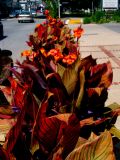July 05, 2004
Framing is everything

Framing is everything in photography, as it is in life. Focusing. Patience. Looking in order to see. Wishing for a larger panorama or a clearer close up. And so I learn lessons about life as I shoot, which many shooters do not.
Let's take framing for example. Very important. Of course, it was pointed out to me that with a photoshop hanging in everyone's electron closet, proper framing is a worry of the past. If you have enough pixels you can extract from a panorama absolutely any fragment you like. So the trick is to find the frame in the panorama upon which you would like to set your gaze
Here's a fabulous example. Richard Brookhiser, in his review in the New York Times, harshly criticizes Hendrick Hertzberg's frame choice for 9/11 in "Observations and Arguments 1966-2004". Hertzberg wrote shortly after the planes hit the towers, "The scale of the damage nothwithswtanding , a more useful metaphor than war is crime. The terrorists of September 11 are outlaws within global polity. Their status and numbers are such that the task of dealing with them should be viewed as a police matter of the most urgent kind."
And what if we had treated 9/11 as a heinous crime? It might have played out differently, perhaps along the lines of the Okahoma City bombing. In fact, for short while, we thought that Timothy McVeigh might be a foreign terrorist. Actually Timothy McVeigh was an All American terrorist, nestled within the survivalist movement right here in the bosom of the USA. Every country has them. Pakistan, Indonesia, Ireland. They should be vigilantly watched, their organizations infiltrated, you know, treated like the Mafia. Where is Interpol anyway?
Consider what would be happening now if 9/11 had been treated more like a crime? A search for the criminals, in their countries of origin, with assistance from the law enforcement structure in the nations who harbor them. For example, we might be looking in Saudi Arabia, since all of the 9/11 criminals were Saudi. Or we might be cooperating with authorities, as we are in Pakistan.
We would not be creating further chaos and hatred by ravaging another nation. Instead we have declared a war on terrorism, and have, in the name of stamping out the enemy, made many more.
In my humble opinion, we need to work in the breeding grounds of dissatisfaction, poverty and injustice all over the world, so that "the criminals" do not recruit the disenfranchised into their fold. It does, after all, feel better to be enraged with purpose, than hopeless and helpless. And that is precisely what terrorism has to offer the hopeless. War is an infection of hatred-- an entire populace possessed by purpose and indignation. The profiteers benefit, as the people die.
Zooming out for a panorama, photographically speaking, I have just finished listening to Gore Vidal's erudite history, "Inventing a Nation" , in which he illuminates the visions, concerns and intentions of our forefathers, as well the ever present opportunistic wish to profit from those visions. Suffice it to say, that George Washington is the altruistic hero of our story, and Alexander Hamilton, the ever present war monger and profiteer, quite the villain. Jefferson is on the right track, but cannot put aside his personal economic considerations as a slave owner.
The authors of the Constitiution could see that the distribution of land to the general population would create a broad and enthusiatic base for a functioning democracy. Disenfranchisement leads to unrest. It is also comforting to know that Alexander Hamilton operated for many years, a group, not unlike the one who runs George W. , interested in personal fortune building and war profitteering , and still democracy survived.
Photo note: A detail from a bevy of calla lilies. The panorama is included below for general orientation.
